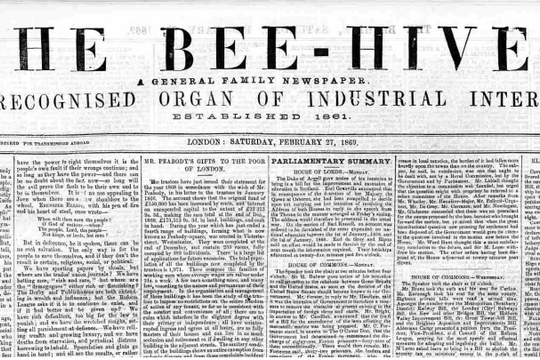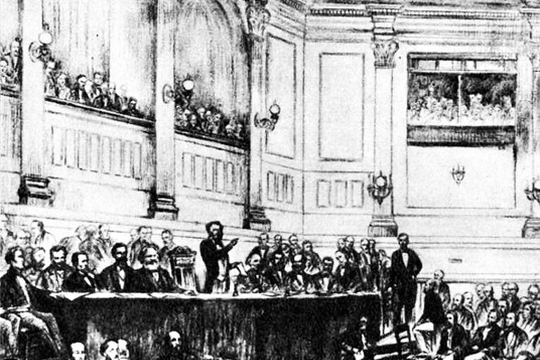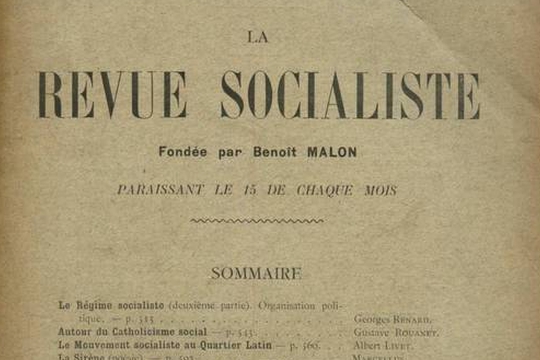Friedrich Engels - Report on the Miners’ Guilds in the Coalfields of Saxony (1869)

theory
Friedrich Engels - Report on the Miners’ Guilds in the Coalfields of Saxony (1869)
by
Friedrich Engels
/
July 9, 2022
in
Karl Marx's Workers Inquiry
(#14)
Chapter Three
Engels’ report constitutes one of the first workers’ inquiries published by the International. The article demonstrates the importance of workplace inquiry in revealing the political character of economic struggles. The reproduction below includes original footnotes from the MECW, and a brief introduction taken from an endnote in the MECW version detailing its publication history.
Engels made out this report at Marx’s request on the basis of material sent in by the Saxon miners front Lugau, Nieder-Würschnitz and Oelsnitz. The miners informed the General Council and Marx personally of their desire to join the International (see Note 58). On February 13, 1869 Marx wrote to Engels that the Lugau miners were the first in Germany to enter into direct contact with the International Working Men’s Association and that it was necessary to give them public support.
Marx highly praised Engels’ report, which was written in English. “Thanks a lot for the report. It is perfectly clear,” he wrote to Engels on February 24. The report was read by Marx to the General Council on February 23, and it resolved to base it published in English and in German translation. An abridged version appeared in a report of the General Council meeting in The Bee-Hive, No. 385, February 27, 1869. Other English newspapers to which Marx applied, including The Times, The Daily News and The Morning Advertiser, refused to publish the document. Marx himself translated Engels’ manuscript into German (see his letter to Engels of March 2, 1869), and it was published in Der Social-Demokrat, No. 33, March 17, Demokratisches Wochenblatt No. 12 (supplement), March 20, and Zukunft, Nos. 67 and 68, March 20 and 21, 1869. The English original has not been preserved.
The report was published in English in full for the first time in The General Council of the first International. 1868-1870, Moscow, 1966.
The first wage scale we take, e. g., that of the Niederwüschnitz Company, shows us the overall condition of the miners in the collieries of the Erzgebirge. A week’s wage for adult miners amounts to from 2 talers to 3 talers 12 silver groschen 6 pfennigs, for juveniles between 1 taler 10 silver groschen and 1 taler 20 silver groschen. A week’s wage for an average miner amounts approximately to 2 2/3 talers. At the demand of the owners the workers have to work at piece rates. The wage scale is arranged in such a way that the piece rate will not usually exceed the normal rate for a day’s work. Every worker must give a month’s notice to leave, and that on the first day of the month. Consequently, if he refuses to work at piece rates on the terms proposed, he can be _forced _to it for 4-8 weeks at the least. Such being the circumstances, it is simply ridiculous to talk of regulating the piece rate by mutual agreement, of a free contract between worker and capitalist!
Wages are paid in two instalments; an advance is made on the 22nd of the month, the remainder for that month being paid on the 8th of the following month. The capitalist therefore retains wages that he owes his workers for a full three weeks on the average — this compulsory loan to the employer is all the more agreeable since money is thus obtained without the payment of interest.
As a rule the miners work in twelve-hour shifts, and the afore-mentioned weekly wages are paid for 6 twelve-hour working days. The twelve-hour working day includes 2 hours (2 half hours and 1 full hour) for meals, or so-called rest periods. If the work is urgent, shifts last eight hours (i.e., each man does 3 shifts in 48 hours) with half an hour for meals; they may even last six hours, in which case “no rest period is granted”.
These facts offer a gloomy picture of the condition of the miners. But to appreciate their serf-like status we must also examine the rules of the miners’ guilds. Let us take the rules for the coal-mines, those of (I) the high and mighty Prince Schönburg, (II) the Niederwürschnitz Company, (III) the Niederwürschnitz-Kirchberg Company, and (IV) the Joint Lugau companies.
The income of the miners’ guilds consists of (1) the workers’ entrance fees and dues, fines, unclaimed wages, etc., and (2) contributions from the capitalists. The workers pay 3 or 4 per cent of their wages, the owners of (I) pay 7 silver groschen 5 pfennigs monthly for every paid-up miner, of (II) 1 pfennig for every scheffel [1/8 ton] of coal sold, of (III) as initial contribution and to found a miners’ guild fund — 500 talers; after that the same dues as the workers, and of (IV) like those of (II), plus a membership fee of 100 talers from each of the joint companies.
Are we not overwhelmed by this picture of friendly harmony between capital and labour? After that, who will dare to go on harping on their contradictory interests? But, as the great German thinker Hansemann once said, “business is business”. So we might ask what the worker has to pay for the magnanimity of the “exalted coal-owners”. Let’s see.
The capitalists contribute in one instance (III) as much as the workers, in all other instances appreciably less. For this they lay claim to the following rights in respect of the property of the guild:
I. “No properly rights in respect of the guild fund shall accrue to members of the miners’ guild, and they shall not expect to obtain more from the fund than the amount to which they, according to the rules, are entitled in certain circumstances, in particular they shall not be able to propose sharing the fund and its ready cash even in the event of any of the works ceasing to operate. Should there be a complete shut-down in the coal-mines of Prince Schönburg in Oelsnitz”, then, after satisfaction of ready claims, “the right to dispose of the remainder is vested in the Prince, owner of the coalfields.”
II. “In the event of the joint Niederwürschnitz Coal Company closing down, the miners’ guild fund shall also be closed down, and the right to dispose of the remaining money is vested in the management.”
Members of the guild fund have no property rights in respect of the guild fund.
III. as in II.
IV. “The guild fund shall be considered the inalienable property of its present members and those who join it in future. Only in the unexpected event of the complete liquidation of all the joint coal-mines and the consequent closing down of the miners’ guild” — now, in this unexpected event one might have expected the workers to be able to divide up among themselves any money remaining. Nothing of the sort! In this case “the management of the last closed trust shall direct suggestions to the Royal District Board. The last-named authority shall decide how this sum of money is to be used.”
In other words, the workers pay the greater part of the contributions to the guild fund, but the capitalists arrogate to themselves the ownership of the fund. The capitalists seem to make the workers a present. Actually, the workers are forced to make a present to their capitalists. Together with the property right, the latter obtain control of the fund.
The chairman of the fund board is the coalfield manager. He is the chief administrator of the fund, he decides all disputed issues, determines the amount of fines, etc. Next below him is the secretary of the guild, who is also the treasurer. He is either appointed by the capitalist or has to get the latter’s approval if he is elected by the workers. Then come the ordinary members of the board. They are usually elected by the workers, but in one instance (III) the capitalist appoints three members of the board. What sort of “board” this actually is can be seen from the rule obliging “it to hold a meeting at least once a year”. Actually it is run by the chairman, and the board members carry out his orders.
This Mr. Chairman, the coalfield manager, is a powerful person in other respects too. He can reduce the probation period for new members, issue extra allowances, even (III) expel workers whose reputation he deems poor, and he can always appeal to the capitalist, whose decision is final on everything concerning the miners’ guild. Prince Schönburg and the managers of the joint stock companies can, for instance, alter the guild rules, raise the workers’ dues, reduce sick benefits and pensions, create new obstacles or formalities in dealing with claims on the fund. In short, they can do what they like with the workers’ money, with the one reservation that they need the sanction of the government authorities, who have never yet displayed any desire to know anything about the condition or needs of the workers. In enterprise III the managers even reserve themselves the right to expel from the guild any worker who has been brought to trial by them, even if he has been acquitted!
And what are the benefits for which the miners so blindly subordinate their own affairs to an alien despotism? Listen to this!
1) In the event of sickness they receive medical treatment and a weekly allowance, in enterprise I — up to a third of their wages, in III — up to a half of their wages, in II and IV — up to a half or, if the illness is due to an accident at work, 2/3 and 3/4 respectively. 2) The incapacitated receive a pension depending on their length of service, and hence on their contributions to the guild fund, from 1/20 to 1/2 of their last wages. 3) If a member dies his widow receives an allowance of between 1/5 and 1/3 of the pension which her husband was entitled to, and a weekly pittance for each child. 4) A burial allowance in the event of death in the family.
The noble prince and enlightened capitalists who compiled these rules, and the paternal government which endorsed them, owe the world the solution of this problem: if a miner with the full average wage of 2 2/3 talers a week is half starved, how can he live on a pension of, say, 1/20 of this wage, some 4 silver groschen a week?
The tender concern which the rules display for the interests of capital comes out clearly in the way mine accidents are treated. With the exception of enterprises II and IV there is no special allowance if illness or death occurs through an accident “in the course of duty”. In not a single case is the pension increased if disability follows from a mine accident. The reason is very simple. This clause would substantially increase payments out of the fund and very soon make even the most short-sighted see the real nature of presents from the capitalist gentlemen.
The rules imposed by the capitalists of Saxony differ from the constitution imposed by Louis Bonaparte1 in that the latter still awaits the crowning touch whereas the former already have it in the form of the following article applicable to all:
Every worker who leaves the company, be it voluntarily, be it compulsorily, thereby leaves the guild and forfeits all rights and claims both to its fund and to the money he himself has contributed.
Thus, a man who has worked 30 years in one mine and contributed his share to the guild fund, forfeits all his hard-earned rights to a pension as soon as the capitalist chooses to sack him! This article turns the wage-worker into a serf, ties him to the soil, exposes him to the most shameful mistreatment. If he is no lover of kicks, if he resists the cutting of wages to starvation level, if he refuses to pay arbitrarily imposed fines, if he dares to insist on official verification of weights and measures — he will always receive the same old answer: get out, but your fund contributions and your fund rights stay with us!
It seems paradoxical to expect manly independence and self-respect from people in such a humiliating position. Yet these miners can be counted — much to their credit — among the vanguard fighters of the German working class. Their masters are therefore beginning to be greatly worried, despite the tremendous hold the present organisation of the miners’ guilds gives them. The most recent and meanest of their rules (III, dating from 1862) contains the following grotesque clause against strikes and associations:
Every guild member must always be satisfied with the pay accruing to him in accordance with the wage scale, he must never take part in joint action to force higher wages, to say nothing of inciting his workmates to the same, but should, rather, etc.
Why have the Lycurguses of the Niederwürschnitz-Kirchberg Coalfield Company, Messers. B. Krüger F. W. Schwamkrug and F. W. Richter not also deigned to make it a rule that henceforward every coal purchaser “must always be satisfied’’ with the coal prices fixed by their exalted selves? This is too much even for Herr von Rochow’s “limited understanding of the loyal subject”.2
As a result of agitation among the miners, preliminary draft rules for the unification of miners’ guilds of all coalfields in Saxony were recently published (Zwickau 1869). They were drawn up by a workers’ committee under the chairmanship of Mr. J. G. Dinter. The main points are: 1) All guilds to be united in a single guild. 2) Members retain their rights as long as they live in Germany and pay their dues. 3) A general meeting of all adult members constitutes the supreme authority. It elects an executive committee, etc. 4) Contributions by the masters to the guild fund must make up half those paid by the workers.
This draft in no way reflects the views of the most intelligent miners of Saxony. It comes rather from a section which prefers reforms with the permission of capital. It bears the stamp of unpracticality on its brow. What a naive idea indeed that the capitalists, unrestrained rulers over the miners’ guilds up to now, will surrender their power to a democratic general workers’ meeting and still pay their contributions!
The basic evil lies in the very fact that the capitalists contribute. As long as this continues, they cannot be removed from running the guild and the fund. To be genuine workers’ societies, the miners’ guilds must rely exclusively on workers’ contributions. Only thus can they become Trades Unions which protect individual workers from the arbitrariness of individual masters. The insignificant and dubious advantages which come from the capitalists’ contributions — can they ever compensate for the state of serfdom into which they force the workers? Let the Saxon miners always remember that what the capitalist puts into the guild fund he gets it all back, and more, from the workers’ wages. Guilds of this type have the unique effect of suspending the operation of the law of supply and demand to the exclusive advantage of the capitalist. In other words, by the unusual hold which they give capital over individual workers, they press down wages even below their usual average level.
But should the workers then present the existing funds — naturally after compensation for the acquired rights — to the capitalists? This question can only be decided by law. Although endorsed by the supreme royal authority, certain articles in the rules patently conflict with generally accepted legal regulations concerning contracts. In all circumstances, however, the separation of the workers’ money from the capitalists’ money remains the essential precondition to any reform of the miners’ guilds.
The contributions of the Saxon coalfield owners to the guild funds are an involuntary admission that capital is up to a certain point responsible for accidents which threaten the wage worker with mutilation or death during the execution of his duty at his place of work. But instead of allowing this responsibility to be made the pretext for extending the despotism of capital, as is the case now, the workers must agitate for this responsibility being regulated by the law.
-
Constitution faite en vertu des pouvairs delegues par le peuple francais a Louis-Napoleon Bonaparte, par le vote des 20 et 21 decembre 1851 - Ed. ↩
-
This expression was used by the Prussian Minister of the Interior, Rochow. In his letter of January 15, 1838 to the citizens of Elbing who had expressed their dissatisfaction at the expulsion of seven opposition Professors front Gottingen University, Rochow wrote: “It behoves a loyal subject to exhibit due obedience to his King and Sovereign … ; it does not behove him to apply the measure of his limited understanding to the actions of the head of the State.” ↩
Featured in Karl Marx's Workers Inquiry (#14)
author
Friedrich Engels
Subscribe to Notes from Below
Subscribe now to Notes from Below, and get our print issues sent to your front door three times a year. For every subscriber, we’re also able to print a load of free copies to hand out in workplaces, neighbourhoods, prisons and picket lines. Can you subscribe now and support us in spreading Marxist ideas in the workplace?


